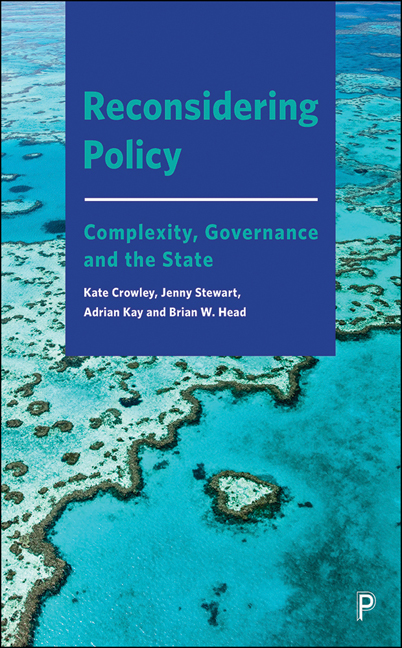Book contents
- Frontmatter
- Contents
- Detailed contents list
- List of tables
- List of abbreviations
- Notes on authors
- Preface: Re-Thinking the Policy Sciences after the ‘Governance Turn’ – Identifying and Creating a (more) Capable State
- 1 Reconsidering Policy – our Agenda
- 2 Reconsidering Policy Systems
- 3 Reconsidering Institutions
- 4 Reconsidering the State
- 5 Reconsidering Borders
- 6 Reconsidering Advice and Advisory Systems
- 7 Reconsidering Information
- 8 Reconsidering Implementation
- 9 Reconsidering Policy Change
- 10 Reconsidering Policy – our Agenda Revisited
- References
- Index
9 - Reconsidering Policy Change
Published online by Cambridge University Press: 23 February 2021
- Frontmatter
- Contents
- Detailed contents list
- List of tables
- List of abbreviations
- Notes on authors
- Preface: Re-Thinking the Policy Sciences after the ‘Governance Turn’ – Identifying and Creating a (more) Capable State
- 1 Reconsidering Policy – our Agenda
- 2 Reconsidering Policy Systems
- 3 Reconsidering Institutions
- 4 Reconsidering the State
- 5 Reconsidering Borders
- 6 Reconsidering Advice and Advisory Systems
- 7 Reconsidering Information
- 8 Reconsidering Implementation
- 9 Reconsidering Policy Change
- 10 Reconsidering Policy – our Agenda Revisited
- References
- Index
Summary
Introduction
Policy change occurs when the goals, methods or effects of a policy are modified. Policy change can occur at many levels and scales, ranging from small adjustments to existing regulations (for example, minor reductions in corporate income tax), through to introducing new social security programs or new environmental protection policies. For many leaders, managers and citizens, the arguments about policy change are the centrepiece of public policy debates. To understand the dynamics of these debates and understand how policy change occurs, we must focus on the interplay between actors, ideas, interests, institutions and political contexts. These dynamics occur under conditions of complexity and uncertainty, and operate at various levels – local, national and global.
This chapter focuses on the theories and frameworks developed by scholars for explaining how policy change actually occurs, and how proposals are modified through conflict and compromise, in the real world of public policymaking. The absence of change in the face of large challenges – such as climate change – deserves close attention and explanation, because the failure of policy systems to learn from knowledge and experience and to develop more effective policies is a major indicator of their capacity for good governance.
Policy debates and negotiations, whether in favour of policy reform or policy continuity, are always conducted within structured contexts. Firstly, policy decisions are embodied in programs and practices that, by their very nature, are institutionalised in rules that operate at several levels (see Chapter 3). Thus, explanations of policy change and stability need to take into account the rules and practices of organisations, which themselves are shaped by the interplay between complex systems – socio-economic, technological, organisational and environmental (see Chapter 2). Secondly, in democratic regimes, explanations of policy change also need to address issues of leadership in mobilising organisational and network support for various options, conservative or radical. Key policy actors – whether government leaders, public sector managers and diverse stakeholders – will typically exhibit a spectrum of views about the feasibility and desirability of modifying existing practices. Thirdly, explanations need to address the capabilities of public decision makers to select appropriate policy instruments and to undertake the ‘steering’ required to orchestrate the cross-organisational arrangements necessary to achieve agreed public purposes.
- Type
- Chapter
- Information
- Reconsidering PolicyComplexity, Governance and the State, pp. 163 - 184Publisher: Bristol University PressPrint publication year: 2020



